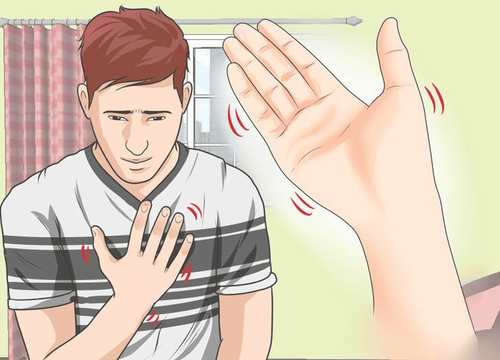This is an automatically translated article.
Almost everyone has to stumble and face difficulties and grief at least once in their life, be it from work, family, relatives and children. It is surprising how difficult it is to recognize all the different aspects of grief. Depending on the case, there are different causes, time to self-heal or prolonged suffering, which seriously affects health status and quality of life.
1. Stages of Grief
Suffering states bring on the body very serious consequences such as increasing inflammation, exacerbating existing health problems and causing new problems. Grief defeats the immune system leading to exhaustion and susceptibility to infection. In addition, grief can increase blood pressure and the risk of blood clots. Severe grief can alter the heart muscle to the point of causing broken heart syndrome, a form of heart disease with symptoms similar to those of a heart attack.
1.1. Ordinary grief Early in the period after a loss, many of the signs and symptoms of normal grief are similar to those of complex grief. In normal grief, sad thoughts and emotions often come in waves or flare up after periods of respite. However, normal grief symptoms can disappear over time as self-esteem, sense of humor are not lost and it is always comforting to be free from the pain by sharing the help of those around you. .
1.2. Depression Pain that is not recognized, it is not addressed and when it is not handled, it lasts longer is one of the causes of depression. Depression is not a normal state of grief, depression increases the risk of grief-related health complications and needs to be treated to avoid possible unfortunate complications, so it is important to Know how to recognize the symptoms of depression.
Can distinguish normal grief from depression by looking for specific emotional patterns. Persistent depression leads to major depressive disorder, where the body struggles with guilt, worthlessness, and negative thoughts of wanting to end the present life.
1.3. Complex Grief Complex grief is different from both depression and normal grief. Complex grief is a persistent, pervasive form of grief that cannot be relieved spontaneously. Symptoms of complex grief include persistent attempts to go through the pain and deny or look back on what happened. Complicated grief increases the risk of physical and mental health problems such as depression, anxiety, sleep problems, and suicidal thoughts and behaviors.

Cảm giác đau khổ cần trải qua một số giai đoạn khác nhau
2. Causes of prolonged grief
2.1. Effects of Avoiding Suffering Life is a cumulative process of suffering. The way we integrate or avoid, process or reverse the pain of loss in all aspects such as work, friendships, relationships, health, things that are important to us begin to become a stereotype. sample. Research shows that repetitive, negative thinking about past hardships, focusing on self-reflection, is actually a way to avoid problems. Contemplatives divert attention away from painful truths by focusing on negative material that is less threatening than the truth they wish to avoid. This type of thinking is closely related to depression.
How does suffering affect health? Avoidant behavior complicates depression, grief, and the health problems that accompany them. Attempts to evade the reality of loss can cause fatigue, weaken the immune system, increase inflammation, and prolong other illnesses.
2.2. The effects of role adjustment When someone close to you dies, your social roles also change. This can affect your sense of self and your sense of self.
Caregivers face particularly complex role adjustments. The physical and emotional demands of caregiving can leave them feeling drained even before a loved one dies, and losing someone they've cared for can cause them to lose consciousness. living. Research shows that during caregiving for stressed people, caregivers not only experience high levels of stress, but also cannot find the time and energy to take care of their own health.
The stress of adapting to changes in life and health before and after loss can increase vulnerability and inability to adapt to cope with loss.
3. How to deal with grief?
Mental and physical self-care are essential ways to ease complications and speed recovery from pain. Exercising, spending time in nature, getting enough sleep, and talking to loved ones can help with health and well-being.

Khi xuất cảm giác đau khổ bạn cần tìm cách đối mặt và khắc phục
4. Psychological treatment
Common grief does not require the intervention of a psychologist. Grief is a natural, instinctive response to loss and adaptation occurs soon after, self-healing is only a matter of time, especially with the support and care of loved ones. love and friends. Social support, self-acceptance, and daily good self-care will overcome normal sadness.
However, complex grief needs to be treated with psychotherapy, known as complex grief therapy, which is similar to psychotherapeutic techniques used to treat depression. This treatment can be effective when done individually or in groups. It is then possible to gain insight into the causes of complex grief and how it is treated, explore grief responses, symptoms, adaptation to loss, and redefine life goals. Besides, holding imaginary conversations with loved ones and recounting the circumstances of death to reduce suffering than before, process thoughts and feelings, improve coping skills, reduce feelings of blame and guilty.
Follow Vinmec International General Hospital website to get more health, nutrition and beauty information to protect the health of yourself and your loved ones in your family.
Please dial HOTLINE for more information or register for an appointment HERE. Download MyVinmec app to make appointments faster and to manage your bookings easily.
Reference source: webmd.com













